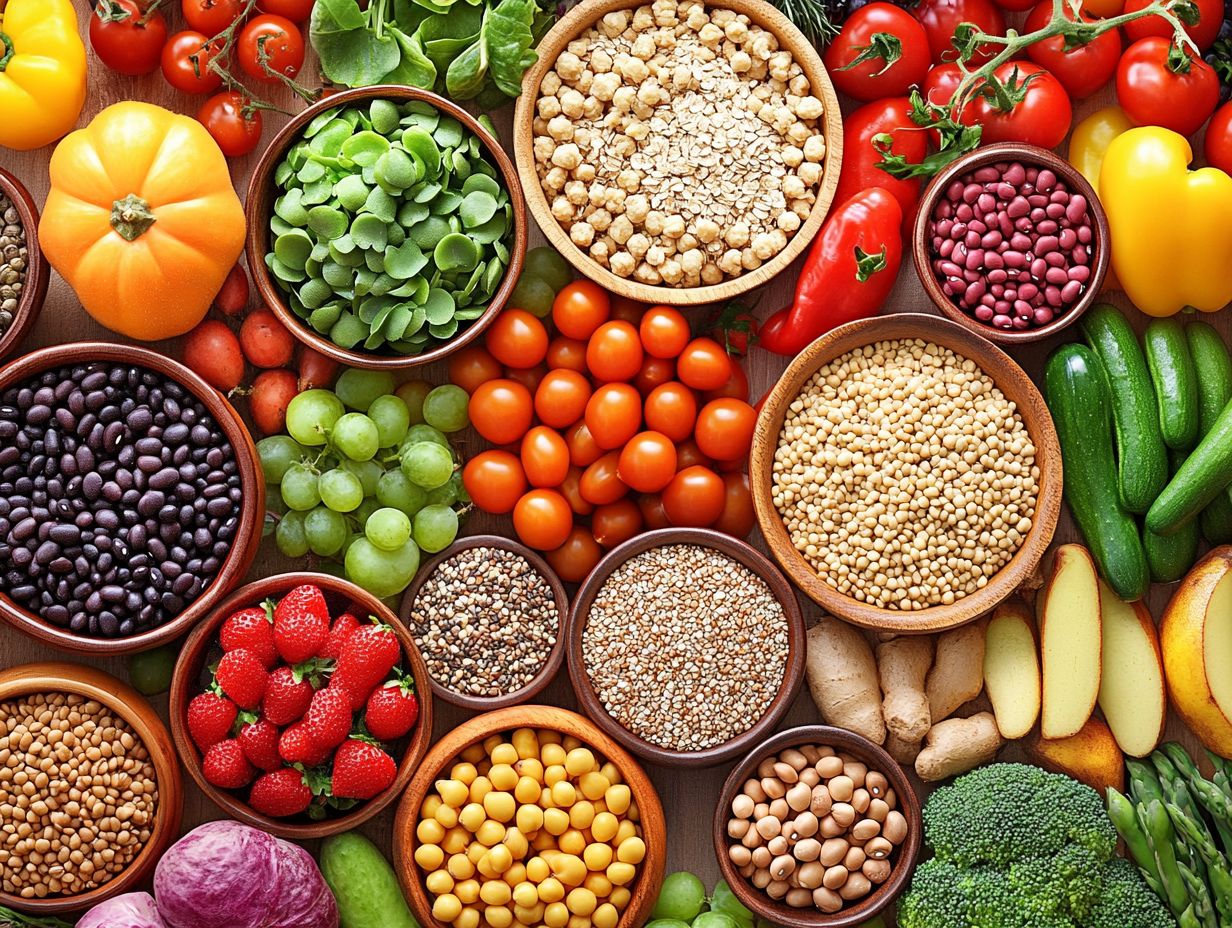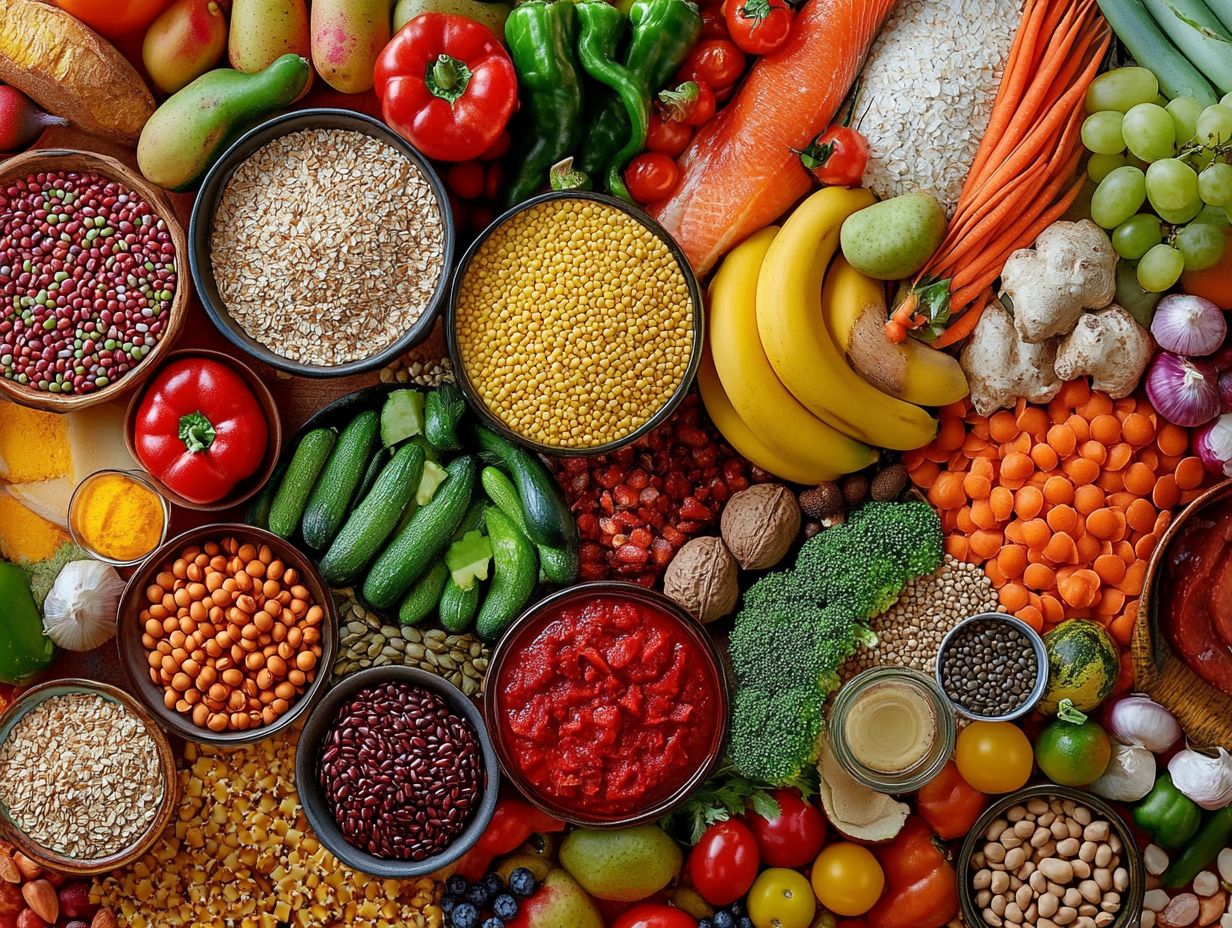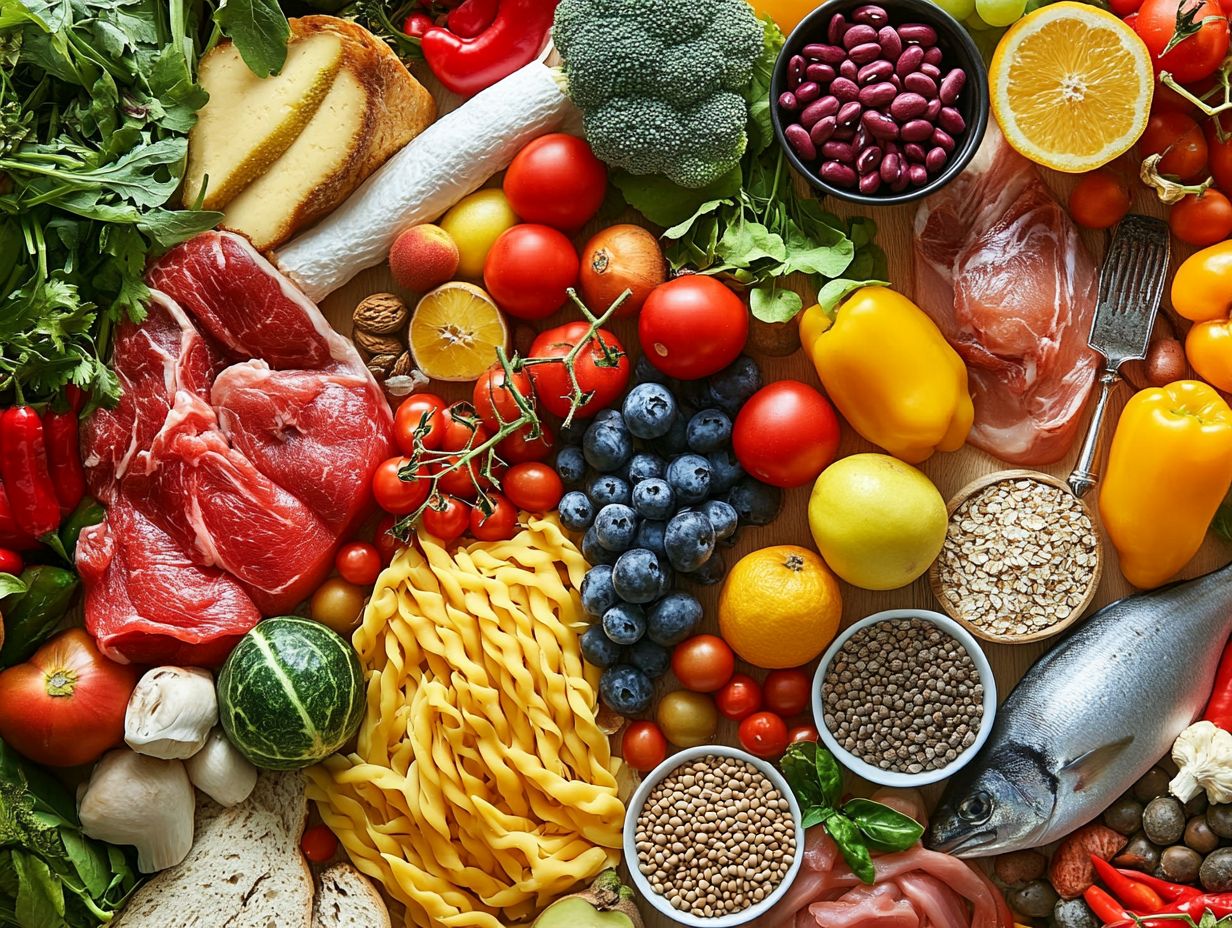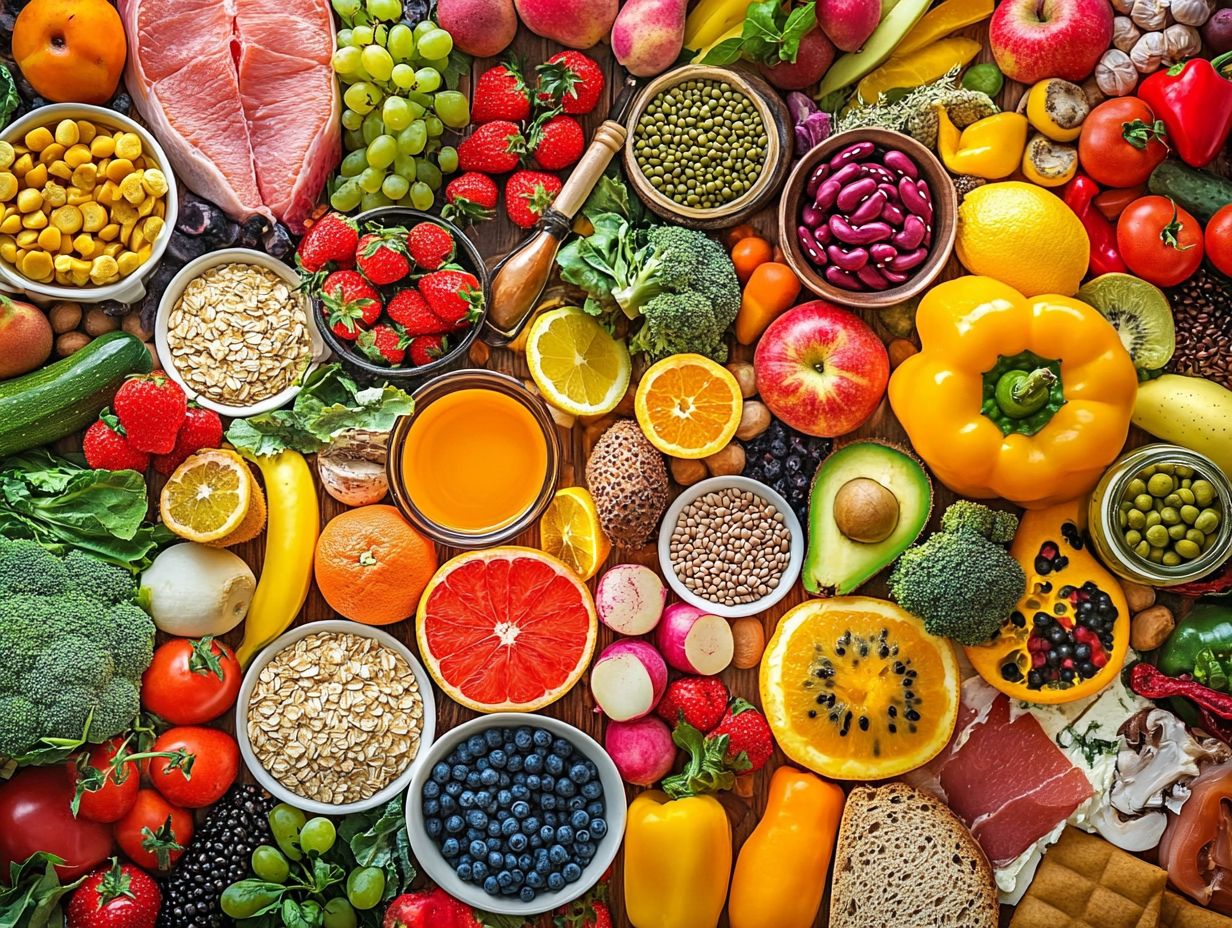What Are the Different Types of Diets?
Choosing the right diet can feel like navigating a crowded marketplace, especially with so many options clamoring for your attention.
Whether it s the heart-healthy Mediterranean Diet or the vibrant plant-based Vegan Diet, each path presents its own set of benefits and challenges. This article delves into 15 popular diets, shedding light on their key features, potential health impacts, and associated risks.
You ll find guidance on how to select a diet that truly aligns with your lifestyle and health objectives.
Get ready to find the perfect diet for you! Let s dive in!
Contents
- Key Takeaways:
- 1. The Mediterranean Diet
- 2. The Paleo Diet
- 3. The Ketogenic Diet
- 4. The Vegan Diet
- 5. The Vegetarian Diet
- 6. The DASH Diet
- 7. The Flexitarian Diet
- 8. The Whole30 Diet
- 9. The Atkins Diet
- 10. The Weight Watchers Diet
- 11. The Zone Diet
- 12. The Raw Food Diet
- 13. The South Beach Diet
- 14. The TLC Diet
- 15. The Volumetrics Diet
- Frequently Asked Questions
Key Takeaways:

- The Mediterranean Diet emphasizes whole foods, healthy fats, and moderate portions of lean protein, and has been associated with a lower risk of chronic diseases.
- The Ketogenic Diet focuses on high fat, moderate protein, and very low carb intake, and has been shown to promote weight loss and improve certain health markers.
- The Vegan Diet eliminates all animal products and emphasizes plant-based foods, and has been linked to a reduced risk of heart disease and some cancers.
1. The Mediterranean Diet
The Mediterranean Diet, renowned for its focus on whole foods, healthy fats, and vibrant flavors, is an exceptional approach for you to achieve your weight loss goals while enhancing your overall health and emotional well-being.
By embracing a diverse array of food groups, this diet effectively tackles a variety of health concerns, particularly in managing chronic conditions like diabetes and heart disease. It emphasizes nutrient-dense options, including a colorful assortment of fruits and vegetables, legumes, nuts, and fish. These foods provide essential vitamins and antioxidants.
What sets the Mediterranean Diet apart from other dietary plans is its remarkable flexibility. This adaptability not only encourages you to stick with it, but also ensures a delightful culinary journey. You’ll find it easier to maintain long-term healthy eating habits without feeling deprived.
2. The Paleo Diet
The Paleo Diet, inspired by the eating habits of our ancestors, champions whole, unprocessed foods while steering you away from modern dietary practices that often pose health risks. It’s no wonder many people are choosing it as a weight loss program.
By focusing on high-quality proteins like grass-fed meats and wild-caught fish, complemented by a vibrant selection of vegetables and healthy fats from sources like avocados and nuts, this diet encourages a nutrient-dense approach to eating. Embracing this lifestyle could lead you to experience a range of potential benefits, including improved energy levels, better digestion, and even enhanced mental clarity.
However, if you have specific health conditions such as kidney issues or diabetes it’s crucial to approach the Paleo Diet with care. The high protein and low carbohydrate content may not be suitable for everyone, so consider your unique health needs before diving in.
3. The Ketogenic Diet
The Ketogenic Diet, with its emphasis on low carbohydrates and high fat, has captured attention for its remarkable ability to induce ketosis (a state where your body burns fat for energy instead of sugar) and facilitate effective weight loss while significantly curbing calorie intake.
This metabolic state arises when your body transitions from relying on glucose (sugar) to using fat as its primary energy source, leading to the production of ketones. Typically, the diet comprises around 70-75% fats, 20-25% protein, and a mere 5-10% carbohydrates.
This structure offers a plethora of potential benefits, including heightened energy levels, sharper mental clarity, and enhanced appetite control. However, it s crucial to keep your individual health circumstances in mind, as the diet may also carry drawbacks, like nutrient imbalances and initial side effects often referred to as the ‘keto flu.’
The ketogenic approach has proven particularly effective in weight loss programs and presents significant potential for managing conditions such as epilepsy and type 2 diabetes.
What diet are you excited to try? Share your thoughts in the comments below!
4. The Vegan Diet
The Vegan Diet, defined by the absence of all animal products, embodies a commitment to ethical eating. It is increasingly acknowledged for its numerous health benefits, especially in fostering a balanced diet rich in superfoods.
Start incorporating a diverse array of plant-based foods think legumes, whole grains, fruits, and vegetables to ensure you receive essential nutrients like protein, iron, and vitamins B12 and D.
Meal planning is essential to avoid a lack of nutrients that can occur when you eliminate entire food groups. A well-structured vegan diet can facilitate weight loss and enhance overall health, as it typically contains fewer calories and is packed with fiber.
Connecting with a supportive community can significantly bolster your commitment and motivation, making the transition smoother and far more enjoyable. Join a community of like-minded eaters and start your plant-based journey today!
5. The Vegetarian Diet
The Vegetarian Diet excludes meat and sometimes other animal products. It presents a wealth of health benefits, including enhanced emotional well-being and a significant reduction in the risk of certain health conditions.
This dietary approach can manifest in various forms, such as lacto (which includes dairy), ovo (which includes eggs), and the lacto-ovo combination, which embraces both. While these diets can provide a rich array of fruits, vegetables, whole grains, and legumes, it s essential to be aware of potential nutritional gaps, particularly concerning vital nutrients like protein, iron, and vitamin B12.
With thoughtful planning, you can easily establish a balanced diet that fulfills your nutritional requirements. Embracing a vegetarian lifestyle not only supports your weight loss aspirations but also enhances your overall health by fostering mindful eating habits and promoting nutrient-dense choices.
Discover the joy of plant-based cooking and share your experiences with others on the same journey!
6. The DASH Diet

The DASH Diet is your key to managing hypertension effectively! It urges you to embrace a balanced diet abundant in fruits, vegetables, whole grains, and lean proteins. This diet champions positive dietary habits and the power of group support.
This nutritional strategy not only assists you in managing blood pressure but also supports your weight loss journey by emphasizing nutrient-dense foods that satisfy without piling on the calories. The DASH Diet has proven particularly beneficial for individuals managing chronic health conditions like diabetes and heart disease.
By promoting low sodium intake, healthy fats, and a rich array of antioxidants, it bolsters cardiovascular health while helping to stabilize blood sugar levels. By incorporating a variety of food choices and nurturing community involvement, you ll likely find it easier to adhere to your dietary changes and meet your health goals.
Take the first step toward a healthier you by exploring the DASH Diet today!
7. The Flexitarian Diet
The Flexitarian Diet presents a sophisticated, flexible approach to eating. It guides you toward a primarily vegetarian lifestyle while still allowing for occasional meat indulgences promoting not only a balanced diet but also enhancing both your physical health and emotional well-being.
This dietary pattern caters to your unique tastes and cravings, making the transition from a meat-heavy diet to one that emphasizes fruits, vegetables, whole grains, and plant-based proteins seamless and enjoyable.
By incorporating more plant-based meals into your routine, you can significantly reduce your risk of chronic diseases like heart disease and diabetes, all while enjoying improved digestion and heightened energy levels.
Unlike stricter vegetarian or vegan diets that may demand more commitment and restrict food choices, the Flexitarian Diet offers a practical framework tailored to your personal needs and preferences. It supports your sustainable weight loss goals without the burden of rigid dietary restrictions, allowing you to thrive while enjoying the foods you love.
Start your Flexitarian journey today, and savor the best of both worlds!
8. The Whole30 Diet
The Whole30 Diet is a transformative, short-term reset that focuses on whole, unprocessed foods for 30 days. It s designed to tackle nutritional issues and health risks while enhancing your emotional well-being.
During this month-long journey, you’ll need to eliminate specific food groups think sugar, grains, dairy, legumes, and alcohol to identify any potential allergens or intolerances. By following these guidelines, you’ll become more attuned to how your body reacts to different foods, providing you with valuable insights into your eating habits.
Many participants experience significant weight loss during this time. The program goes beyond that; it inspires lasting dietary changes and encourages you to adopt a more mindful approach to food.
Ultimately, the Whole30 acts as a catalyst for developing a healthier relationship with food, paving the way for a balanced and informed lifestyle.
Consider trying the Whole30 Diet to reset your eating habits and discover how different foods affect your body!
9. The Atkins Diet
The Atkins Diet, renowned for its low-carb ethos, places a strong emphasis on protein intake while dramatically cutting back on carbohydrates. It’s a popular choice for many eager to shed weight, though it s important to remain aware of the associated health risks.
This dietary plan unfolds in four distinct phases. It starts with a rigorous induction period that limits carbohydrate intake to prompt rapid ketosis a state where the body burns fat for energy instead of carbohydrates followed by a gradual reintroduction of carbs.
You ll find that the macronutrient breakdown typically features elevated protein and fat levels while significantly reducing carbohydrate consumption. This can effectively support fat burning and curb your appetite.
While it s common for individuals to see substantial weight loss in the early stages, questions about long-term sustainability often arise. Without careful management, this approach might lead to nutritional deficiencies.
It’s crucial to stay attuned to your overall health and evaluate how this diet fits into your long-term wellness aspirations.
Consider exploring the Atkins Diet if you’re looking for a low-carb approach to weight loss.
10. The Weight Watchers Diet
Weight Watchers, now rebranded as WW, offers you a flexible plan that emphasizes portion control and mindful eating. This supportive weight loss program is bolstered by group support and community engagement, creating an environment tailored to your success.
At the heart of WW’s strategy is its innovative points system, which assigns values to foods based on their nutritional content. This allows you to make informed choices about what to eat without the dreaded feeling of deprivation.
Complementing this system is comprehensive nutritional education. It teaches you not just which foods to enjoy but also the reasons behind their benefits.
The sense of community that WW cultivates through group meetings and online platforms provides much-needed encouragement and accountability. As a result, many participants find that this combination gives them the power to achieve their weight loss goals and embrace healthier lifestyles.
Consider joining WW to benefit from its supportive community while you work towards your weight loss goals!
11. The Zone Diet
The Zone Diet offers a smart approach to nutrition by emphasizing the ideal balance of protein, carbohydrates, and fats, designed to optimize your health and amplify your weight loss efforts.
Focusing on a macronutrient distribution of approximately 30% protein, 40% carbohydrates, and 30% fats, this dietary plan seeks to regulate insulin levels and enhance metabolic function.
Many who embrace this diet often find themselves experiencing heightened energy levels and enhanced mental clarity, both of which can profoundly impact their overall well-being.
Adhering to these specific ratios can be challenging especially with meal planning and preparation. It’s essential to recognize both the potential rewards, such as sustainable weight loss and improved health markers, and the hurdles that may arise in maintaining this disciplined eating pattern.
Consider trying the Zone Diet if you want a balanced approach to nutrition that supports your weight loss journey!
12. The Raw Food Diet

The Raw Food Diet focuses on raw foods. It offers health benefits, but be careful! If not balanced, it can cause diet issues.
This approach includes a vibrant array of fruits, vegetables, nuts, seeds, and sprouted grains. Many advocates feel more energized and connected to their food.
Evaluate your dietary needs and consult healthcare professionals to maintain a proper balance of nutrients. Macros are the main nutrients your body needs in larger amounts, like proteins, fats, and carbs. Micros include vitamins and minerals needed in smaller amounts.
Start by gradually introducing raw foods. This will help you adjust and minimize any digestive discomfort.
13. The South Beach Diet
The South Beach Diet is a popular weight loss program emphasizing a harmonious balance of good carbohydrates and healthy fats. This approach helps you lose weight without compromising on nutritional quality.
The program is structured into three distinct phases. It starts with a rigorous elimination of sugar and refined carbs, gradually reintroducing healthier options in the following stages.
As you progress, enjoy a diverse array of foods like lean proteins, fresh vegetables, and healthy fats, while avoiding heavily processed items, sugars, and trans fats.
This plan not only supports your weight loss goals but also aligns with your overall health aspirations. Countless success stories show how individuals achieved remarkable weight loss. Take control of your dietary choices and overall well-being today!
14. The TLC Diet
The TLC Diet is your go-to strategy for lowering cholesterol and promoting heart health. It helps you reach your weight loss goals while enhancing emotional well-being.
Prioritize nutrient-rich foods: vibrant fruits, fresh vegetables, whole grains, and lean proteins. These choices not only help manage cholesterol levels but also provide essential vitamins and minerals for your overall wellness.
Opt for unsaturated fats instead of saturated ones, and monitor your sodium intake. These choices significantly impact blood pressure and heart function.
This diet also pairs well with others, like the Mediterranean or DASH diets, making it versatile for specific health concerns, especially heart disease.
Embrace these practices for a healthier lifestyle and enjoy sustainable long-term health benefits!
15. The Volumetrics Diet
The Volumetrics Diet encourages you to embrace low-calorie density foods that promote satiety and support weight loss while enhancing emotional well-being.
This approach suggests filling your plate with nutrient-rich fruits, vegetables, and whole grains. This creates a satisfying sense of fullness without the burden of excess calories.
Make thoughtful food choices a priority to savor meals without feeling deprived a crucial element for long-term success.
Understanding the psychological dynamics of eating is key, as this diet nurtures a positive relationship with food and helps manage cravings effectively.
Engaging in group support and community initiatives can amplify these benefits, creating an encouraging environment that transforms your journey towards healthier eating habits into an enjoyable and sustainable experience!
What Are the Key Differences between These Diets?
Different diets, like the Mediterranean, Paleo, and Vegan diets, can help you lose weight and improve your health. Understanding these diets empowers you to make the best choice for your lifestyle.
The Mediterranean diet focuses on healthy fats and whole grains. It s rich in antioxidants and fiber, which can lower chronic disease risks.
The Paleo diet promotes whole, unprocessed foods. This approach is great if you want to cut carbs and increase protein.
The Vegan diet avoids all animal products. This choice is perfect for those seeking ethical eating and weight loss while boosting plant-based nutrients.
By understanding these differences, you can choose a diet that fits your goals and lifestyle.
How Do These Diets Affect Overall Health?
These diets significantly influence your overall health, especially regarding weight loss, healthcare, and emotional well-being through improved eating habits.
Each dietary approach offers unique benefits, such as enhancing cardiovascular health or boosting metabolism. However, they may also present risks you need to consider.
While some diets might promise quick weight loss, they could lead to nutrient deficiencies and other health complications if not balanced properly.
Sustainable dietary changes are vital for holistic health. These changes impact not just your physical fitness but also your mental resilience and emotional stability.
By prioritizing nutrient-rich foods and embracing mindful eating practices, you can cultivate a healthier relationship with food, ultimately benefiting both your body and mind.
What Are the Potential Risks of Each Diet?

Each diet carries its own risks that can affect your eating habits, weight loss, and emotional well-being. This underscores why it s crucial to make informed choices.
Many restrictive diets can lead to nutrient deficiencies, depriving you of vital vitamins and minerals. These deficiencies might manifest as fatigue or a weakened immune system.
Making drastic dietary changes can also disrupt your metabolic balance, causing problems like hormonal disruptions or digestive troubles.
For this reason, it s crucial to consult a healthcare professional before making significant dietary shifts. This ensures a safe progression toward your health and wellness goals.
How Can One Determine Which Diet Is Right for Them?
Finding the right diet for you involves examining your unique needs, health care requirements, and personal dietary habits to effectively reach your weight loss goals.
Existing health conditions like diabetes or heart disease are critical in shaping your nutritional approach. Your lifestyle, including activity levels and daily routines, must also be considered to ensure practicality and sustainability.
Your preferences regarding specific foods and cooking habits can significantly impact your adherence to any chosen plan. Seeking guidance from a registered dietitian can provide personalized recommendations that align with your goals.
Their ongoing support and expertise can help make your journey smoother and more successful.
Frequently Asked Questions
What Are the Different Types of Diets?
There are various types of diets, including:
- Ketogenic diet
- Paleo diet
- Vegetarian diet
- Vegan diet
- Mediterranean diet
- Low-carb diet
What is a Ketogenic Diet?
A ketogenic diet is high in fat and low in carbs. It helps your body enter a state called ketosis, burning fat for energy instead of carbohydrates. This diet can be a game-changer for those aiming to shed pounds!
How does a Paleo Diet differ from other diets?
Imagine eating just like our ancestors! A Paleo diet is based on the foods available during the Paleolithic era, such as lean meats, fish, fruits, vegetables, nuts, and seeds. It excludes processed foods, grains, and dairy products.
This diet focuses on whole, unprocessed foods and aims to mimic the eating habits of our ancestors.
Can a Vegetarian Diet provide all the necessary nutrients?
Yes, a well-planned vegetarian diet can provide all the necessary nutrients for a healthy and balanced diet. It includes plant-based foods like fruits, vegetables, grains, legumes, nuts, and seeds.
With smart planning, you can get all the nutrients you need no meat required!
What is the main difference between a Vegan and Vegetarian Diet?
The main difference between a vegan and vegetarian diet is that a vegan diet excludes all animal products, including eggs, dairy, and honey. On the other hand, a vegetarian diet may still include some animal products, such as eggs and dairy.
Wondering if you can still enjoy cheese? A vegetarian diet allows it, but vegans skip all animal products!
Is the Mediterranean Diet a good option for heart health?
Yes, the Mediterranean diet is often recommended for heart health. It includes plenty of fruits, vegetables, whole grains, fish, and healthy fats, such as olive oil.
If you want to boost your heart health, the Mediterranean diet is a fantastic choice start today!






